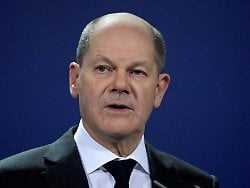“I have no travel plans”
Scholz stays away from the Olympic Games
2/3/2022 3:17 am
When the Winter Olympics open in China on Friday, Chancellor Scholz will not be sitting in the stands with President Xi Jinping. It is unclear whether a representative of the federal government will travel to Beijing at all. Foreign Minister Baerbock and Interior Minister Faeser ruled that out weeks ago. Criticism comes from CSU boss Söder.
Chancellor Olaf Scholz has no plans to travel to Beijing for the Winter Olympics. “I have no travel plans,” said the SPD politician on ZDF’s “heute journal”. “That’s why you can’t assume that I’ll suddenly show up and say: Hello, here I am.”
Scholz had left questions about visiting the Olympic Games unanswered for many weeks. On Wednesday afternoon, government spokesman Steffen Hebestreit said in response to a question: “We will inform you promptly about the Chancellor’s trips.” Scholz will certainly not fly to the opening ceremony on Friday. Among others, the Russian President Vladimir Putin, the heads of state of Poland, Serbia, Egypt, Argentina, Kazakhstan and Turkmenistan as well as the Crown Prince of Saudi Arabia are expected in Beijing.
Government spokesman Hebestreit was unable to say whether an official representative of the federal government would take part in the ceremony in the Olympic Stadium in the Chinese capital. At the request of the German Press Agency, the Federal Foreign Office said that no one from its side would be there – including no representative from the German Embassy in Beijing. CSU boss Markus Söder called for a government representative to attend the celebration. “I think that a German foreign policy must remain a topic of discussion despite all the skepticism.”
The USA had announced a diplomatic boycott of the games from February 4th to 20th weeks ago. Australia, Canada, Great Britain and New Zealand joined. The background is above all the human rights situation in the most populous country in the world. The leadership in Beijing has been criticized for its dealings with the Muslim Uyghurs in Xinjiang province and the Tibetans, but also for the suppression of the pro-democracy movement in Hong Kong and threats against Taiwan.
Chancellor Scholz had repeatedly emphasized that there was a voting process in the European Union on the issue of the diplomatic boycott. “As far as I know, this process is still ongoing,” said government spokesman Hebestreit. However, individual EU countries have already committed themselves – for example, Poland’s President Andrzej Duda is driving to the opening.
Baerbock: “Participation not usual for foreign ministers”
Foreign Minister Annalena Baerbock and Interior Minister Nancy Faeser, who is responsible for sports, had already decided in December that they would not travel to Beijing. However, both made it clear that these are personal decisions that have nothing to do with the fundamental political decision on a diplomatic boycott. “I’m a big sports fan, but I definitely won’t be going to the Olympics during this time – that wasn’t usual for foreign ministers in the past either,” said Baerbock in a dpa interview. Interior Minister Faeser, who is responsible for sports, had a spokesman explain that she did not want to travel to Beijing herself “due to the pandemic”.
“Staying away alone is not a solution,” commented Söder. He could well have imagined Baerbock “expressing her critical attitude in talks in Beijing.” In general, there is a trend in foreign policy to work with statements. The trusting conversation is often neglected. You also have to show respect for the athletes who have been training for years and often feel very alone.
The governments of China’s neighboring countries also deal differently with the Olympics. Japan is not sending a government delegation, but expressly does not want to speak of a diplomatic boycott. South Korea’s government will be represented at the Games by Minister of Culture, Sports and Tourism Hwang Hee.
